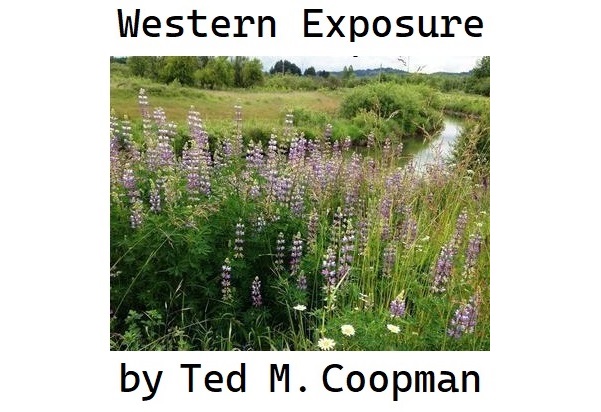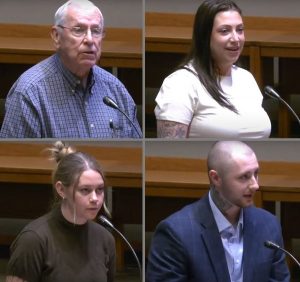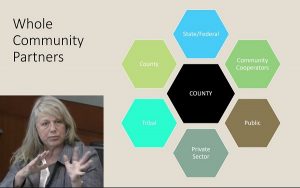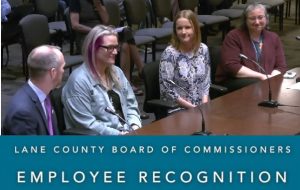Truth and consequences: Street camping disproportionally impacts low-income neighborhoods
7 min read
by Ted M. Coopman
There was much consternation and no small amount of political posturing at the March 11 City Council meeting about enhancing penalties for RV and trailer street camping. While councilors and advocates expressed concern and compassion for RV dwellers, no mention was made of the residents living in the homes beside which those RVs and trailers are parked.
City data clearly show that the poorest neighborhoods with high concentrations of renters and communities of color bear most of the burden, suffering the impacts of RVs and trailers homesteading on neighborhood streets.
The result is pockets of poverty made up of those with housing and those without, leading to de facto areas of economically segregated communities. There really is no other way to describe it. The city’s failure to adequately address the use of residential neighborhoods by people living in RVs as shelter has disproportionately increased hardship for our lowest-income residents.
Unconditional compassion for people who are homeless is easy when you do not have to pay the price for that compassion. Most important, those who are homeless are not an undifferentiated group, which is why the proposed ordinance targets only the worst repeat offenders.
Once again, the city’s homeless policy is predicated on shifting the impacts onto the backs of the working poor to make up for the shortage of sanctioned campsites.
Groundhog Day ad infinitum
In 2021, city council passed (7-1) an ordinance that prohibited parking an RV or similar vehicle in residential neighborhoods overnight. The purpose was to address serious issues with these oversized vehicles being used for shelter near homes. Problems included trash, noise, generators running all night, theft of services (water, electricity), drug dealing, gray and black water dumping, intimidation, retaliation against residents, and blocking line of sight. While this policy was well meaning in intent, it failed in execution.
There were so many caveats and expansive timelines before enforcement action that an RV could stay at a location for a week or longer before it was even “orange tagged” (a warning to move or be cited). RV dwellers quickly figured this out, so would simply move to a new location, often nearby. Moving even a block or two away meant that it was as if the RV never had been tagged and the whole process started again.
Under current policy, this process happens over and over. Many RVs and trailers in neighborhoods bear the remains of multiple orange tags. This has set up a cycle where neighbors report an RV, the city responds with multiple visits by staff, the RV moves, often leaving a mess for neighbors to deal with, and the whole process starts again. This has been a tremendous waste of limited staff resources and neighbors’ time and patience. Often, RVs repeatedly return to the same spots.
The new ordinance lacked any consequences to encourage a change in behaviors. Therefore, in August 2022, the Jefferson Westside Neighbors Executive Board sent a letter to Council requesting that the ordinance be updated to included penalties for “willful violators.” Over a year later, Council acted, and the result is the proposal under discussion.
Are we learning yet?
The purpose of a notice (orange tag) or a citation for street camping is not punishment but education, as with, “Please do not do this again.” However, if someone ignores the not-so-subtle hint, fines are imposed. The problem is that there are few if any consequences for not paying the fines.
It can be argued that someone who is unhoused, despite being able to operate a 70-foot RV, does not have the money to pay a fine. However, it does not exempt them from following the rule after repeatedly being reminded of it. This is why Council asked staff to draft a rule that would be more compelling to follow as the consequences would be more dire.
While no one wants to see someone who is using an RV have it impounded, the fact is, despite all the overheated rhetoric, RV street campers have to do some crazy things to warrant a tow truck. The sad tales of people whose homes were towed off without any warning are a fabrication. That fate is avoided easily.
After years of trying to get street campers and abandoned vehicles removed from my neighborhood, I can tell you it is nearly impossible. People park their RVs in neighborhoods like Far West because they are flat, near services, and renters and low-income people are less likely to know they have rights and where to complain. RV dwellers have options other than parking in front of someone’s home.
The reality
“Coercive Compassion” tells the tale of an RV, inoperable, with stolen out-of-state plates and expired tags, that was towed from location to location around the Jefferson Westside neighborhood. Often orange-tagged, occasionally cited, it would appear in front of homes, spilling out into parking strips, hosting parties and “bike repair” sessions at all hours, and then leaving a pile of trash as it was towed off behind an old pick-up truck. This went on for months. It finally wound up, two wheels on the curb strip with an old couch in front of a neighbor’s home. Only at that point did it get towed. Its occupants and their friends screamed threats and homophobic slurs at the terrified homeowners.
Expand your empathy
The fact is that the impacts of this sort of camping are not trivial. The most intense impacts are felt by low-income neighbors, mostly renters, and the few who managed to scrap together enough money to buy a fixer in an attempt to build generational wealth.
Consider Ana, who described having to train her 10-year-old daughter to identify all sorts of drug paraphernalia to avoid and is forced weekly to clean up human waste from her yard. Or Craig, who had an RV parked in front of his home for a week whose owners were dealing drugs and partying all night. The owners of New Frontier Market had RV campers threaten their lives and destroy their property, costing this local business thousands of dollars in damage. Our elderly neighbors had someone’s trailer catch on fire under their trees in front of their home. These same campers even returned to the same spot a few weeks later.
Put yourself in a neighbor’s position. You wake up in the morning and there is a 50-foot run-down RV in front of your home. It has no license plates. The owners have taken your parking strip as their front porch and are running an old loud generator. Their many “friends” come and go at all hours. They watch you come and go. You can be brave and politely ask them to leave. They tell you to f**k off and that no one will make them leave for at least a week so why should they move their RV?
Once the city does tag them, you must worry about them retaliating against you because they know where you live. Are you feeling compassionate yet?
Advocates have options
Eugene city code allows anyone to host an RV in their driveway or on their property under certain basic conditions. That would be the choice of that resident. It is simply not reasonable or ethical to coerce compassion from random residents to fulfill someone else’s ideological agenda.
So, the first question asked should be: Have you made the choice to exercise your compassion by hosting one of these RV dwellers? If not, how can you ethically make others do so?
While residents don’t “own” the streets in front of their homes, neither do RV dwellers. Public streets are for storage. That’s why parking an RV overnight in a residential neighborhood or any vehicle for over 72 hours is prohibited.
Why react when you can overreact?
The proposed ordinance is designed to address serious problems with perhaps 15-20 repeat willful violators who torture residents and cause the city to waste limited resources. A vast majority of homeless people, including those who live in RVs, would never pull up in front of a home and set up housekeeping. Why? Because it is an aggressive action.
Illegal street camping continues because little has been done to stop it. When homeless advocates demand the city do nothing about illegal street camping because that somehow achieves justice, the cost is inflicting injustice on some of our poorest and most vulnerable neighbors whose only crime is scraping together enough money for housing.
Western Exposure is a semi-regular column that looks at issues and challenges from a West Eugene perspective – a perspective that is often ignored or trivialized by city leadership and influential groups and individuals largely based in south and east Eugene.
Western Exposure rejects the fauxgressive party line, performative politics, and “unicorn ranching” policy in favor of pragmatism focused on the daily experiences of residents and small businesses in Eugene—and West Eugene in particular.
Ted M. Coopman has been involved in neighborhood issues since 2016 as an elected board member, and now chair, of Jefferson Westside Neighbors and has 30+ years experience as an activist and community organizer. He earned a Ph.D. in Communication (University of Washington) and served on the faculty at San Jose State University from 2007 to 2020.
Ted’s research on social movements, activist use of technology, media law and policy, and online pedagogy has been published and presented internationally and he taught classes ranging from research methodology to global media systems. He and his spouse live in Jefferson Westside with an energetic coltriever and some very demanding and prolific fruit trees.



